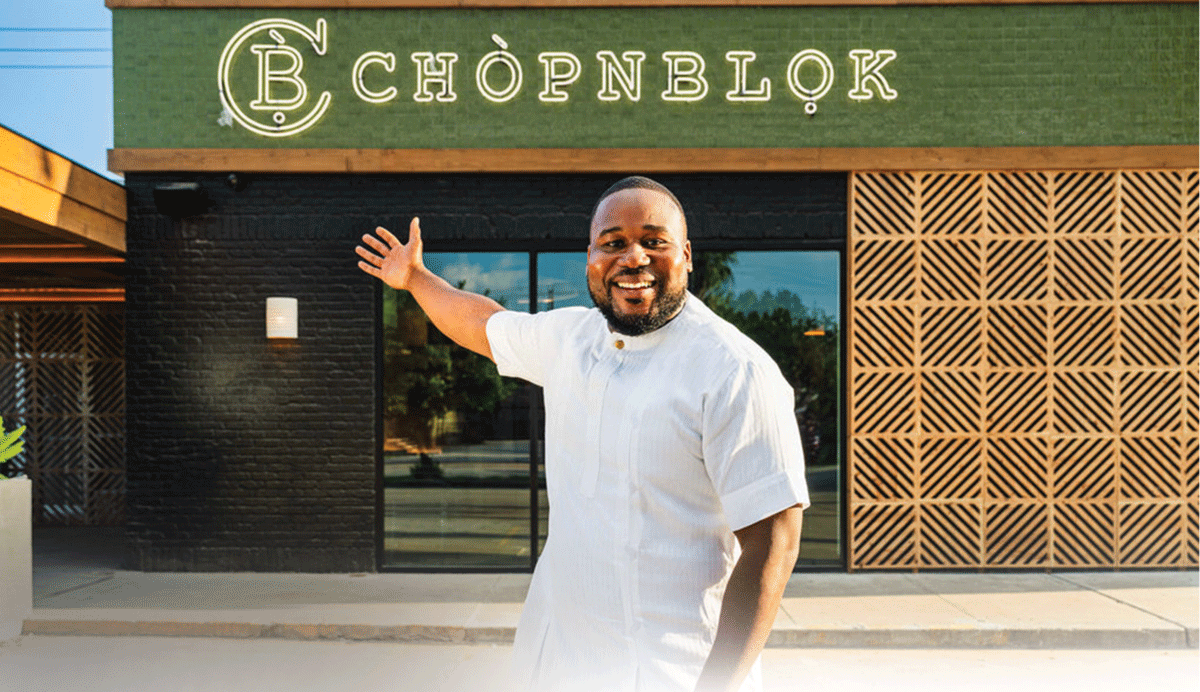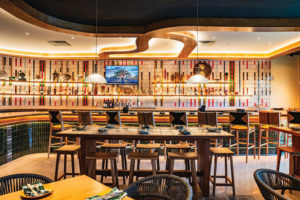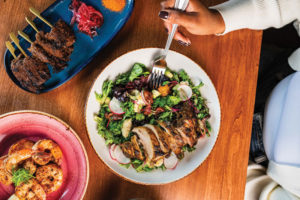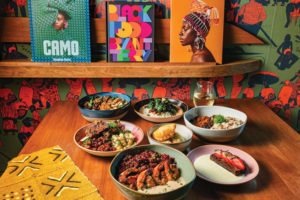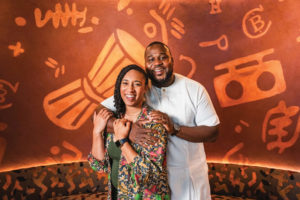Ope Amosu is combining his business acumen and West African culinary roots to achieve the American Dream.
By all measures, Ope Amosu (’10) was doing everything “the right way.” After graduating with a business degree, he landed a job in his hometown of Houston, Texas, where he earned an MBA from Rice University. He secured a high-paying corporate job in the energy sector that took him around the world. On paper, he was the model example of a School of Business graduate, so much so that he was named the Business Young Alum of the Year in 2017.
With the brightest of career paths ahead of him, Amosu instead pivoted to invest in himself and do something he found more culturally significant.
“I was asking myself, ‘why is it difficult for me, regardless of where I am in the world, to gain access to the cultural elements that I grew up on as a Nigerian immigrant that moved to the U.S. at the age of three?’” he said. “I decided to create the first modern contemporary West African-inspired food and beverage concept, but now it’s turned into a mission of making my culture more accessible and building community along the way.”
The seeds of a food-related career, in hindsight, began for Amosu in childhood. As early as elementary school he was mixing together sauces and selling them to classmates in the cafeteria, and he sold homemade cookies in high school.
“Some of my earliest entrepreneurial pursuits happen to deal around food,” he said. “I’ve always been very enamored with culture and restaurants and hospitality. It’s been something that’s a part of me since growing up.”
Amosu’s vision has come to life in the form of ChòpnBlọk, a West African-inspired restaurant. After his initial location debuted in 2021 and became the top-grossing eatery in the trendy POST Houston entertainment district, Amosu opened a second restaurant, a 3,000-square-foot space in the city’s historic Montrose neighborhood.
The name ChòpnBlọk comes from the Pidgin English spoken by more than 300 different tribes in West Africa, and it is a micro example of the unity Amosu is striving to create.
“In that dialect the word chop means to eat, and block is a location,” he said. “If you’re coming from a different background and you see ‘chop and block’ it registers immediately this is a location to go to eat.”
The welcoming vibe extends beyond semantics. For example, the menu includes jollof rice, an African precursor to Cajun jambalaya. Amosu has crafted a meal that combines elements of both dishes, which not only allows him the opportunity to share a story about West African culture, it opens his restaurant to a wider customer base.
“That’s how we start to walk you into maybe less familiar territory. It’s very much designed to build community in the sense of welcoming everyone home,” he said. “We can’t only be serving Africans. We’re really going to be sharing this with the world.”
At first glance, ChòpnBlọk might have the appearance of an overnight success, but the foundation of its prosperity was built by Amosu’s business background and his humility to start at the beginning. For several years, after laboring at his corporate job during the day, he would work in restaurants at night in roles like dishwasher and line cook. When he was accepting his award for Business Young Alum of the Year, no one in the room knew he had a second job at Chipotle so he could get hands-on industry experience.
As Amosu gained skills, he started crafting his own dishes, testing them out by hosting dinner parties for friends once a month, each time taking their feedback and factoring it into the next item.
“It was basically like a market segmentation exercise for me from 2018 all the way through 2020,” he said.
From there, he expanded to taking over existing restaurants on their slower nights, offering up the dishes he spent years perfecting. It was a grassroots approach that helped when the first location of ChòpnBlọk opened.
“What we were really doing was building a customer base and building advocates, building a following,” he said.
His business model worked, and Amosu has been featured in national media including an episode of “Top Chef” on Bravo, “No Passport Required” on PBS and “Taste the Nation with Padma Lakshmi” on Hulu. ChòpnBlọk even partnered with the Houston Rockets to be the first West African cuisine available in a professional U.S. sports stadium.
If Amosu has a secret weapon in building ChòpnBlọk it’s his wife Janelle (Gill) Amosu (’10), who, in addition to providing her accounting expertise, serves as a sounding board and level head of the operation.
“We balance each other out. I am the big picture, visionary, aspirational, optimistic person, and she is very much the realist,” he said. “From the early days, she’s really the only person I can truly lean on. She keeps me grounded.”
Before reaching the age of 40, Amosu is already well into his second career, and just like his first, he’s doing everything “the right way.” In an industry synonymous with volatility, he and Janelle have meticulously planned for stable growth, and his goal of one day owning 100 ChòpnBlọk franchises is anything but far-fetched. One could say he is still the model School of Business graduate.

